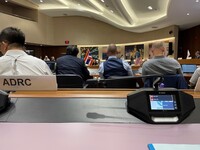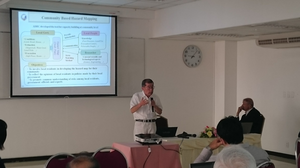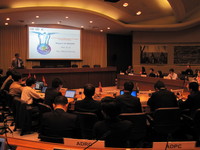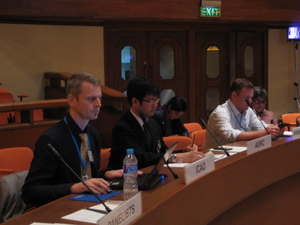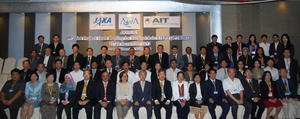Activity Report: Area & Country >> Thailand
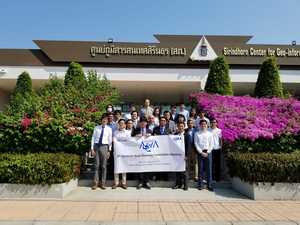
The ISDR ASIA PARTNERSHIP FORUM meeting was held on 14 and 15 December 2017 in Bangkok, Thailand and attended by many DRR officials and practitioners. The participants were welcomed by Ms. Kirsi Madi, Director, UNISDR, followed by opening remarks and official opening by Ms Sayanaa Lkhagvasuren, Chief Adviser to Deputy Prime Minister and Head of DPM's Office, Government of Mongolia. After a round-table introduction of the Participants, Ms. Loretta Hieber Girardet, new chief, UNISDR Regional Office for Asia Pacific presented the draft agenda.
On Day1, 16 countries including Japan made their brief progress reports on the implementation of the Sendai Framework and the Asia Regional Plan for Implementation of the Sendai Framework for Disaster Risk Reduction by following the three questions informed by UNISDR, (1. Major achievements made in year 2017, 2. Main challenges and 3. Ongoing or upcoming main programmes/activities/events, followed by reports by international organizations and diverse stakeholders including ADRC in the afternoon .
ADRC first briefed about ACDR2017 held in Azerbaijan and the APECworkshop on rural infrastructure BBB, shared challenges ADRC member countries answered in the questionnaire survey in Azerbaijan and the ACDR2018 in Awaji for the 20th anniversary as the key upcoming event.
Day 2 started with the report made by UNISDR on the outcome of the Technical workshop to launch the Sendai Framework Monitoring Process held Bonne workshop 6-8 December, and the key dates and milestones for 2018-2019. Participants then discussed priority issues of Sendai Framework by splitting themselves into groups. In the afternoon, Mongolia reported about the status of preparation for AMCDRR and the preparatory process. In April, another IAP meeting will be held for the preparation for AMCDRR in July 2018.
Photo: Report by Ms. Setsuko Saya, Cabinet Office, Japan
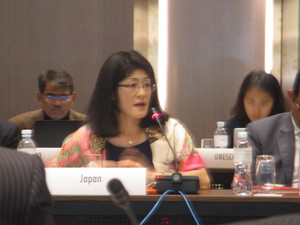
Photo: Report by UNISDR
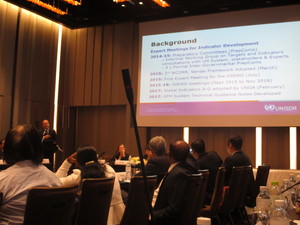
Day 1 started with the opening remarks by the two co-chairs of SC, Dr.Lar, AIT and Mr.K. Suzuki, Executive Director,NIED, followed by a briefing by JAXA on Steering Committee Mandate and status and lessons learnt from emergency observation so far. ADRC then reported advantages of earth observation satellite imagery at diverse phases of DRR and challenges of Sentinel Asia operation from the viewpoint of DRR organisations. As a start of discussion, ADRC gave some cases of emergency situations in which satellite imagery could deliver useful information facilitating DRR operation including mega disasters affecting extensive geographical coverage beyond borders or flood affecting remotely located areas difficult to access lasting weeks, volcano eruptions hindering the use of airplanes, and so on to identify the strength of satellite imagery for DRR purposes.
Space agencies and research organisation reported about the DAN activities. The day 2 focused first on basic idea to discuss the strategic plan after the 10th anniversary, which will be discussed throughout this year towards the APRSAF scheduled in Autumn 2017.The agenda of the 10th anniversary event scheduled in March was also discussed and approved.
The young generation does not share the experiences of the Indian Ocean Tsunami in 2004. Lessons learnt from the past experiences will help us elaborate anti tsunami measures well adapted to individual areas, while high tech today will facilitate improving community based Tsunami DRR.
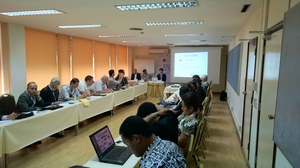
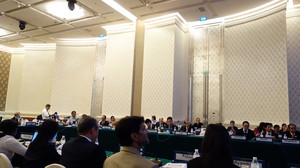
20-24 October 2014 (Bangkok, Thailand)
ADRC participated in the 9th Integrated Workshop of the Typhoon Committee which was jointly organized by the United Nations Economic and Social Commission for Asia and the Pacific (UNESCAP), the World Meteorological Organization (WMO) Typhoon Committee Secretariat on 20-24 October 2014. The more than 80 participants who attended the meeting included representatives from China, D.P.R. Korea, Japan, Lao, Malaysia, Philippines, Republic of Korea, Thailand, US, Viet Nam, Hong Kong and Macao Special Administrative Regions, as well as representatives of the organizing institutions.
The participants discussed their approaches of "Synergized, Integrated, Collaborative Standard Operating Procedures Strategies to Improve Early Warning System for Coastal Multi-hazards" which was the main theme of the meeting. And reports were given on the typhoon damage sustained in each country, as well as on the current year's activities. These included the project on Synergized Standard Operating Procedures for Coastal Multi-hazards Early Warning System (SSOP), in which ADRC is involved.
For the Disaster Risk Reduction Working Group, it was also considered that the participation in the "UN World Conference on Disaster Risk Reduction" at Sendai, Japan on March 2015 as the Typhoon Committee.
The Typhoon Committee has two other working groups covering meteorology and hydrology, in addition to the working group on disaster risk reduction. This time, the three working group meetings were held together as an integrated event.
For more information, visit the Typhoon Committee website:
http://www.typhooncommittee.org/9IWS/
(2014/10/28 19:40)
22-27 June 2014 (Bangkok, Thailand)
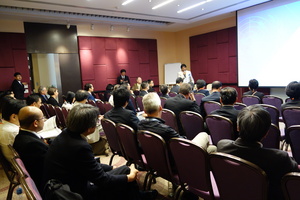 On occasion of the Sixth Asian Ministerial Conference on Disaster Risk Reduction (6AMCDRR), a biennial conference in Asia to ensure political and stakeholder's commitment towards disaster risk reduction implementation, the International Recovery Platform (IRP) organized a side event
On occasion of the Sixth Asian Ministerial Conference on Disaster Risk Reduction (6AMCDRR), a biennial conference in Asia to ensure political and stakeholder's commitment towards disaster risk reduction implementation, the International Recovery Platform (IRP) organized a side event
"Investing in Recovery for Resilience: Articulating Recovery in HFA2" was organized on June 24, 2014 at Lotus 4, Bangkok Convention Center at Centara Grand. Following the opening and special remarks by Mr. Kaoru Saito, Director of Cabinet Office, Japan, with panelists coming from diverse backgrounds, including Atty. Violeta Seva of Makati City (Philippines), Prof. Santosh Kumar of SAARC Disaster Management Center (SDMC), Mr. Tadao Hasue and Ms. Kumi Onuma of Development Bank of Japan (DBJ), and Ms. Ana Cristina Thorlund of International Recovery Platform (IRP), past experiences were highlighted to draw insights. The moderator Mr. Saber Hossain Chowdhury, Member of Parliament Bangladesh, raised the broad question: What will be the critical recommendations to adequately articulate recovery in HFA2?
After consolidating all the inputs from speakers and audience, the side event came up with the following key recommendations:
- Institutionalizing recovery functions in national and local governance systems
- Ensuring financial predictability for recovery programs and activities
- Strengthening coordination of recovery actors as well as considering the trans- boundary nature of recovery
- Recognizing human security as an essential foundation for effective recovery
- Developing concrete and measurable indicators to monitor progress of implementation and achievement of recovery goals
In view of these recommendations, it was suggested that the future role of IRP may consider acting as a global mechanism for cooperation in the areas of recovery. Its task may include providing technical support on recovery for subnational governments, contributing to achieve sustainable development goals (SDGs), offering technical support on recovery from technological disasters or conflicts, and ensuring seamless integration of recovery in with development plans.
Three key conclusions were reached at the end of the session. Firstly, recovery should be adequately articulated in HFA2 so that governments can have general guidance in implementing recovery programs. Secondly, recovery (seen as an opportunity to build back better) must also be aligned with the sustainable development goals. Finally, recovery needs further advocacy at the policy and legislative levels to outline clear measures for monitoring progress as well clear roles of government departments and units in implementing recovery programs.
The event was concluded successfully with the closing remarks by Mr. Kiyoshi Natori, Executive Director of ADRC.
The IRP booth showcased various knowledge products including Guidance Notes on 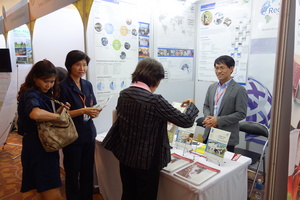 Recovery, newsletters, thematic reports, brochures, and materials on recovery from IRP partners. In addition, the works and activities of IRP are presented in attractive posters that caught the attention of many delegates at the conference. the Secretariat pursued wider dissemination of IRP products and services as well as building and strengthening partnerships.
Recovery, newsletters, thematic reports, brochures, and materials on recovery from IRP partners. In addition, the works and activities of IRP are presented in attractive posters that caught the attention of many delegates at the conference. the Secretariat pursued wider dissemination of IRP products and services as well as building and strengthening partnerships.
Following the 6AMCDRR, the IRP Secretariat participated in the workshop on "Job-rich Recovery after Natural Disasters: Lessons from the Great East Japan Earthquake" organized by ILO Asia-Pacific Office on 27 June 2014 at the United Nations Convention Center in Bangkok.
The objectives of the workshop included raising awareness of the relevance of employment and social protection policies in the contexts of disaster risk prevention and post-disaster reconstruction; sharing experiences, lessons, and good practices generated from the reconstruction process in Japan since the 2011 Great East Japan Earthquake; and identifying strategies for further enhancing knowledge on job-rich disaster risk prevention and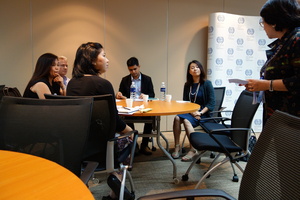 reconstruction practice in Asia and the Pacific. The participants who attended the workshop were experts and practitioners in employment policy, social protection, and disaster risk management from selected governments, humanitarian, and development assistance organizations in Asia and the Pacific.
reconstruction practice in Asia and the Pacific. The participants who attended the workshop were experts and practitioners in employment policy, social protection, and disaster risk management from selected governments, humanitarian, and development assistance organizations in Asia and the Pacific.
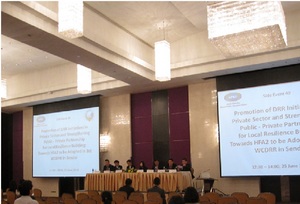
10-13 February 2014 (Bangkok, Thailand)
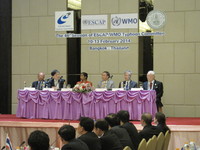 The Asian Disaster Reduction Center (ADRC), participated in the 46th Session of the Typhoon Committee which was jointly organized by the United Nations Economic and Social Commission for Asia and the Pacific (UNESCAP), the World Meteorological Organization (WMO) Typhoon Committee Secretariat, Thai Meteorological Department in Bangkok on 10-13 February 2014.
The Asian Disaster Reduction Center (ADRC), participated in the 46th Session of the Typhoon Committee which was jointly organized by the United Nations Economic and Social Commission for Asia and the Pacific (UNESCAP), the World Meteorological Organization (WMO) Typhoon Committee Secretariat, Thai Meteorological Department in Bangkok on 10-13 February 2014.
The more than 70 participants who attended the meeting included representatives from China, Japan, Malaysia, Philippines, Republic of Korea, Singapore, US, Viet Nam, and the Hong Kong/Macao Special Administrative Regions, as well as representatives of the organizing institutions.
The participants discussed action plan of this committee's three working groups on meteorology, hydrology and disaster risk reduction (DRR) in the next year as well as their activities in the last year.
And the progress of SSOP (Synergized Standard Operating Procedures for Coastal Multi-Hazards Early Warning System) project with which ADRC involves also reported in this session.
Furthermore, regarding the Typhoon Haiyan which raged in the last year, the delegates of Philippines gave a presentation of the damage and the recovery states, and WMO etc reported the assistance for them such as the provision of the typhoon information.
As a result, we had a fruitful discussion such as the enhancement of cooperation among member countries.
For more information, visit
http://www.typhooncommittee.org/46th/index.html
(2014/2/10 19:40)
27-29 November 2013 (Bangkok, Thailand)
The third session of the Committee on Disaster Risk Reduction, organized by the United Nations Economic and Social Commission for Asia and the Pacific (ESCAP), was held at the United Nations Conference Centre in Bangkok, Thailand, from 27 to 29 November 2013.
As a cooperation of this committee, the ADRC sent one representative from IRP secretariat to attend. The forum's many participants included officials from UNESCAP member countries, and experts from intergovernmental organizations.
During the session titled "Item 4: Mainstreaming disaster risk reduction into development", Mr. Shingo Kouchi, ADRC Senior Expert as well as IRP Senior Recovery Expert, valued the Government and people of UNESCAP member countries' high ability to promote recovery and reconstruction efforts following each large-scale disasters. Mr. Kouchi also noted that ADRC and IRP have long been in help to ADRC member countries' efforts to utilize Japanese technologies, experiences, and lessons related to disaster risk reduction. Among those is three month-long Visiting Researcher (VR) Program, a capacity building program which ADRC offers government officials, and we are pleased to observe many former VRs are now playing a central role at their ministries in charge of disaster management.
Mr. Kouch also emphasized the importance of everyday preparedness by citizens, in addition to the government efforts, when a massive disaster strikes. In this connection, the two big events; ADRC's "Asian Conference on Disaster Reduction" to be held in Tokyo, Japan in 4-6 March 2014, and IRP's "International Recovery Forum" to be held in Kobe, Japan in 21 January 2014, will show the evidence of progress of disaster reduction and preparedness toward the next UN World Conference on Disaster Reduction in 2015.
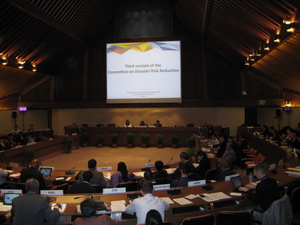
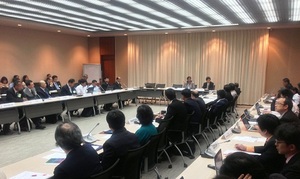
21-22 March, 2012 (Bangkok Thailand)
The Workshop on Use of Multi-Global Navigation Satellite Systems for Sustainable Development organized by UNESCAP and supported by JAXA, was held in Bangkok, Thailand from 21 to 22 March 2012.
Government officials and experts from 13
countries and intergovernmental organizations participated in the workshop and
discussed potential utilization of Multi-Global Navigation Satellite Systems
(Multi-GNSS) in the fields of transportation, disaster risk reduction and
agriculture.
http://www.unescap.org/idd/events/2012-Workshop-Multi-GNSS-21-22-Mar-2012/index.asp
(2012/3/23
11:30)
6 December 2011 (Thailand)
Asian Disaster Reduction Center started consultation with relevant orgnizations to explore possible and appropriate cooperation activities in recovery process from the devastating floods in Thailand. Please refer to the ADRC Highlights Vol. 225 at http://www.adrc.asia/highlights/NewsNo225.
(2011/12/06 13:10)
9-10 May 2011 (Cambodia)
The ADRC attended the 22st meeting of sub-committee on space technology and applications (SCOSA) held from 9th to 10th May 2011 in Siem Reap, Cambodia.
Various organizations in ASEAN countries which are related to the space technology attended this meeting in order to discuss on-going and future projects by SCOSA and other relevant. .
For the last two year the ADRC has been implementing "Satellite Data Utilization for Disaster Risk Reduction and Response" funded by Japan-ASEAN Integration Fund (JAIF). Eight ASEAN countries, namely, Indonesia, Philippines, Lao PDR, Myanmar, Thailand, Vietnam, Cambodia and Brunei Darussalam are the target countries of the project.
In this meeting, ADRC made a progress report on the project.
ADRC is currency producing materials to be used at planned seminars and trainings in each ASEAN country.
For more details of this project, please look at the following site; http://www.geoinfo.ait.ac.th/adrc/index.htm
2011/6/2 13;20
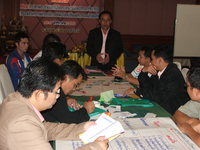 Department of Disaster Prevention and Mitigation (DDPM) of Thailand's Ministry of Interior and Asian Disaster Reduction Center (ADRC) jointly organized a workshop for local government officials in its northeastern province Khon Kaen at Khon Kaen Hotel on 30-31 August.
Department of Disaster Prevention and Mitigation (DDPM) of Thailand's Ministry of Interior and Asian Disaster Reduction Center (ADRC) jointly organized a workshop for local government officials in its northeastern province Khon Kaen at Khon Kaen Hotel on 30-31 August.This workshop was part of capacity building program of local government officials for ASEAN countries, under which DDPM and ADRC had prepared since 2009 for further promoting capacity development. And it was a final activity of this program in Thailand.
A total of 41 local officials attended the workshop to take lectures on disaster risk management and countermeasures and to visit disaster-prone areas for making hazard maps as a case study. The participants reassured the importance of promoting disaster risk management activities in their areas through the workshop.
Led by experienced trainers, who are government officials themselves, the workshop facilitated active participation of many participants from surrouding areas. Further, the trainers improved their teaching materials and methods through three previous workshops within this program. Therefore, it is expected that DDPM will continue activities of this kind in other areas of Thailand by making good use of the experiences of this program.
11-20 August, Bangkok, Thailand
27 August-3 September, Manila, Philippines
10-17 September, Nay Pyi Taw, Myanmar
Asian Disaster Reduction Center (ADRC) conducted the program "Capacity Building of Utilization of Satellite Image for Disaster Management" in Bangkok, Thailand from 11th to 20th Aug, Manila, Philippines from 27th Aug to 3rd Sep, and Nay Pyi Taw, Myanmar from 10th to 17th Sep in cooperation with Asian Institute of Technology (AIT).
This program consists of one-day seminar and five- day training, both to promote the utilization of space based technology. It was held in collaboration with Geo-informatics and Space Technology Development Agency (GISTDA), Thailand, Philippines Institute of Volcanology and Seismology (PHIVOLCS), and Ministry of Science and Technology (MOST), Government of Myanmar, respectively.
This is one of the four capacity development programs in ASEAN countries that ADRC has been implementing since 2008, with other three including disaster education promotion, development of Web-based GLIDE-associated disaster database and capacity building of local government officials.
Satellite Images has been utilized to implement emergency activities in Thailand, Philippines and Myanmar. However, the experience of the engineers for utilization of the satellite data in these countries is insufficient. The capacity building of engineers in relevant fields is an urgent need.
ADRC will continue to cooperate with GISTDA, PHIVOLCS, MOST and other relevant agencies to further promote the utilization of satellite data in the field of disaster management. ADRC also plans to conduct this program in other ASEAN countries.
For more details of this project, please visit ADRC web site (http://www.adrc.asia/top_j.php).
(2010/10/06 13:20)
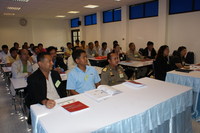
Thailand's Department of Disaster Prevention and Mitigation (DDPM), Ministry of Interior and Asian Disaster Reduction Center (ADRC) organized a workshop targeting local government officials in its southern province Songkla.
On 19-20 July 2010, a total of 30 local officials gathered at a Songkla Campus of Disaster Prevention and Mitigation Academy in the province to take lectures on disaster risk management and countermeasures and visit disaster-prone areas for making hazard maps.
With the lead by experienced Trainers, who are government officials themselves, the workshop brought about active participation in the program which was co-developed by DDPM and ADRC. The participants reassured the importance of both structural and non-structural measures during the activities.
This workshop is part of capacity building program of local government officials for ASEAN countries, under which DDPM and ADRC have prepared since 2009 for further promoting capacity development in the country. Followed by this batch, similar workshops are scheduled in northern and north-eastern provinces this year.
(2010/08/05 17:40)
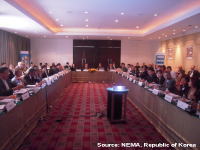 The ADRC attended the ISDR Asia Partnership (IAP) Meeting held from 24 to 26 March 2010 in Bangkok. The meeting focused on the next cycle of HFA (Hyogo Framework for Action) progress reporting, the process and implications of HFA Mid-term review, and the preparations for the Fourth Asian Ministerial Conference on Disaster Risk Reduction (AMCDRR). As many as 80 participants, including government officials from the Asian countries, as well as representatives of international and regional organizations such as ASEAN, APEC, and SOPAC attended the meeting. The ADRC introduced the result of the ACDR2010 and future expected activities based on the recommendations made in the conference.
The ADRC attended the ISDR Asia Partnership (IAP) Meeting held from 24 to 26 March 2010 in Bangkok. The meeting focused on the next cycle of HFA (Hyogo Framework for Action) progress reporting, the process and implications of HFA Mid-term review, and the preparations for the Fourth Asian Ministerial Conference on Disaster Risk Reduction (AMCDRR). As many as 80 participants, including government officials from the Asian countries, as well as representatives of international and regional organizations such as ASEAN, APEC, and SOPAC attended the meeting. The ADRC introduced the result of the ACDR2010 and future expected activities based on the recommendations made in the conference.8 March 2010 (Bangkok, Thailand)
The new web system that been produced as part of Sentinel Asia Step 2 for the last two years will start its operation from April 2010.
The Sentinel Asia Secretariat, ADRC and other relevant agencies held a meeting at Geo-informatics and Space Technology Development Agency, GISTDA, in Bangkok, Thailand, to share information on the new web system.
The new web site is located at;
https://sentinel.tksc.jaxa.jp
(2010/03/30 13:20)
Thailand and the Philippines
February - March 2010
From late February through early March 2010, the Asian Disaster Reduction Center (ADRC) conducted trainings for government officials in charge of disaster management with Thailand's Department of Disaster Prevention and Mitigation (DDPM), and Philippines' Office of Civil Defense (OCD) and National Disaster Coordination Council (NDCC) in Bangkok and Manila respectively. (Photos: Thailand and the Philippines, from above)
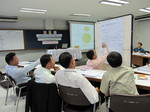 The trainings are part of ASEAN cooperation project Capacity Building of Local Government Officials on Disaster Management. ASEAN's national disaster management organizations and the ADRC conduct training for trainers (TOT) and then the trainers give lectures at workshops for local government officials in each country.
The trainings are part of ASEAN cooperation project Capacity Building of Local Government Officials on Disaster Management. ASEAN's national disaster management organizations and the ADRC conduct training for trainers (TOT) and then the trainers give lectures at workshops for local government officials in each country.
 During this TOT in Thailand and the Philippines, the participants took lectures on various DRR/DRM topics developed by experts from each country such as the institutional framework of DM system in their countries and disaster-specific issues including flood, tropical storm, earthquake and tsunami. The two trainings drew positive response from the attendants, resulting in active discussion among them over the covered topics and coming workshops. They will give lectures as trainers in subsequent workshops for local officials, which are scheduled in the middle of this year.
During this TOT in Thailand and the Philippines, the participants took lectures on various DRR/DRM topics developed by experts from each country such as the institutional framework of DM system in their countries and disaster-specific issues including flood, tropical storm, earthquake and tsunami. The two trainings drew positive response from the attendants, resulting in active discussion among them over the covered topics and coming workshops. They will give lectures as trainers in subsequent workshops for local officials, which are scheduled in the middle of this year.
(2010/03/08 17:40)
17-18 November 2009 (Bangkok, Thailand)
25-26 November 2009 (Paro, Bhutan)
ADRC has initiated a pilot project of DRR Policy Peer Review this year. This new project is aimed at developing DRR capacity of ADRC member countri es by sharing information and strengthening the relationship among member countries. The topic for this year has been selected as "disaster education and public awareness" and Bhutan and Thailand for countries to be reviewed.
After the submission of country reports by two target countries, reviewer teams, which consist of one officer from a member country, one expert from Japan and one from ADRC per a target country, have visited target countries to conduct surveys.
Thailand
On 17-18 November 2009, the ADRC reviewer team, composed of Mr. Naoki Shiratsuchi of Japanese Red Cross, Dr. Alvaro Antonyan of Armenian National Survey for Seismic Protection Agency and Ms. Maki Yoshida of the ADRC, visited Thailand
During the two day survey, the team visited various ministries and institutions, including Department of Disaster Prevention and Mitigation (ADRC's counterpart in Thailand), Ministry of Education, National Disaster Warning Center and Thai Red Cross Society to examine how they have been making the efforts for disaster education and public awareness by government and non-governmental organisations in Thailand.
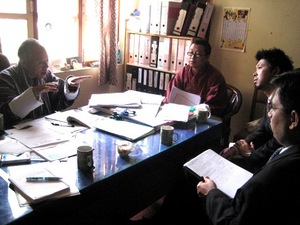 Bhutan
BhutanAnother reviewer team composed of Dr. Koichi Shiwaku of Earthquake Disaster Mitigation Research Center of the National Research Institute for Earth Science and Disaster Prevention (EDM-NIED), Mr. Arshad Nawaz Chheena from Pakistan's National Disaster Management Authority and Ms. Maki Yoshida of ADRC visited Bhutan on 25-26 November 2009 and conducted the survey by learning about their ongoing efforts for disaster education and public awareness by visiting Department of Disaster Management (ADRC's counterpart in Bhutan), Department of School Education, Department of Geology and Mines, Standard Quality and Control Authority and UNDP office.
This project aims at developing the mutual learning process among the ADRC member countries in stead of one-way learning. After the survey missions, reviewer teams will compile survey reports and send them to target countries and then to ADRC member countries to enhance cross-fertilisation. In addition, ADRC will further elaborate on the programme based on the results of this year's project for possible improvement in the ways this project is conduced for coming years.
ADRC would like to express its sincerest gratitude to all of those who have made precious contribution to this project this year.
(2009/11/16 16:50)
2009/08/17-18 (Bangkok, Thailand)
ADRC organized a regional workshop as part of the "ASEAN Cooperation Project on Capacity Building for Local Government Officials on Disaster Management" in Bangkok, Thailand on 17-18 August 2009 with precious support from Department of Disaster Prevention and Mitigation (DDPM) of the Thai Government.
ADRC has been implementing the JAPAN-ASEAN Integration Fund (JAIF) Project "the Capacity Building for Local Government Officials on Disaster Management" since August 2008. In implementing this project, ASEAN member countries have been divided into the following three groups:
•First Year Group (August 2008 - March 2010): Cambodia,
Lao PDR and Vietnam;
•Second Year Group (May 2009 - December 2010): Brunei
Darussalam, Malaysia, Philippines, and Thailand; and
•Third Year Group (February 2010 - September 2011): Indonesia,
Myanmar and Singapore.
The workshop in Bangkok was attended by countries of all three groups so as to achieve the following objectives:
(1) To better understand the concept and direction of
this project in ASEAN;
(2) To facilitate information sharing on the implementation of
the project; and
(3) To help improve the conduct of the project by learning from
the countries that has undertaken the project.
In the Introductory Session, ASEAN Secretariat and ADRC made presentations on the JAIF Project and the progress in this project made to date respectively. In the subsequent sessions, the representatives of each group presented the progress in this project made so far and relevant issues followed by lively discussion and exchange of ideas among participants.
(2009/08/17 17:30)
23 June 2009 (Thailand)
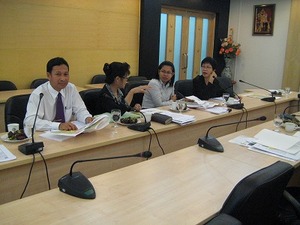 On 23rd June 2009, ADRC held the Coordination Meeting for Japan-ASEAN Integration Fund Project "Promotion of Disaster Education of Schools" in collaboration with Office of the Permanent Secretary and Basic Education Commission, the Ministry of Education of Thailand. In the meeting, the project outline was introduced and the latest situation of disaster education in Thailand was reported. A lot of materials have already been developed; therefore, it is effective to make use of them for our activity. Hereafter, the teaching materials will be drafted for the Training of Pilot Teachers.
On 23rd June 2009, ADRC held the Coordination Meeting for Japan-ASEAN Integration Fund Project "Promotion of Disaster Education of Schools" in collaboration with Office of the Permanent Secretary and Basic Education Commission, the Ministry of Education of Thailand. In the meeting, the project outline was introduced and the latest situation of disaster education in Thailand was reported. A lot of materials have already been developed; therefore, it is effective to make use of them for our activity. Hereafter, the teaching materials will be drafted for the Training of Pilot Teachers.
(2009/06/16 18:30)
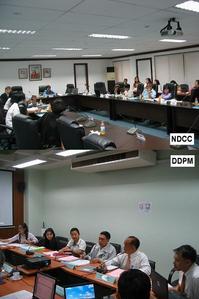 22-23 April (Manila, Philippines), 27-28 April (Bangkok, Thailand)
22-23 April (Manila, Philippines), 27-28 April (Bangkok, Thailand)
The second year program of the ASEAN project was launched in the Philippines and Thailand in April 2009, which aims at capacity building of local government officials in disaster management in the region. The program covers Brunei Darussalam, Malaysia, the Philippines and Thailand this year.
The ADRC held conducted kick-off meetings on 22-23 in Manila, and then on 27-28 April in Bangkok with the national disaster management organizations of Philippines' National Disaster Coordination Council (NDCC), and Thai Department of Disaster Prevention and Mitigation (DDMP) respectively. The participants of the meetings identified the needs for training based on the disaster management systems and training experiences of the countries. Then discussed on the program were issues such as training topics, experts to give lectures, the details for training of trainers and subsequent training for local government officials, and development of training materials. Also the participants visited training facilities for disaster management in both countries, the National Defense College of the Philippines (NDCP) of the Philippines and Disaster Prevention and Mitigation Academy (DPMA) of Thailand.
(2009/05/25 17:40)
22 March 2009 - 22 March 2010
ADRC has been implemented the project for the satellite Imagery Application to Disaster Reduction facilitated by Japan-ASEAN Integration Fund (JAIF).
Eight ASEAN member countries, namely, Indonesia, Philippines, Lao PDR, Myanmar, Thailand, Vietnam, Cambodia, Brunei Darussalam, has participated in this project.
ADRC in cooperation with the Asian Institute of Technology, AIT(http://www.ait.ac.th/) will be organizing a seminar and training in each country to enhance their capacity of satellite imagery application to disaster reduction.
To this end, the first round of kick-off meetings, were held in each country as shown below.
Based on the results of those kick-off meeting, ADRC and AIT, will work together to produce relevant materials to be used at planned seminars and trainings in each country http://www.geoinfo.ait.ac.th/adrc/index.htm
・National Institute of Aeronautics and Space, Indonesia, 22 March 2009
・Philippines Institute of Volcanic and Seismology, Philippines, 25 March 2009
・Remote Sensing Center, Lao PDR, 23 April 2009
・Ministry of Science and Technology, Myanmar, 12 May 2009
・Geo-informatics and Space Technology Development Agency, Thailand, 8 Jun 2009
・National remote Sensing Center, Vietnam, 10 July 2009
・Department of Geography, Cambodia, 27 July 2009
・Survey Department, Brunei Darussalam, 22 March 2010
(2010/03/30 13:20)


